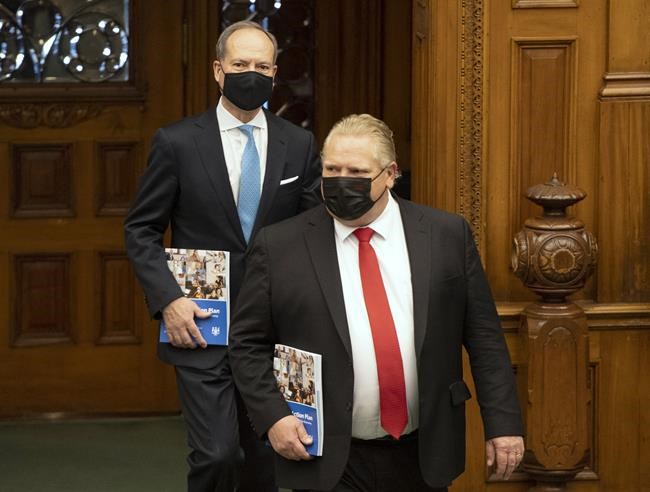Ontario ‘disappointed’ with Supreme Court ruling upholding federal carbon price
Advertisement
Read this article for free:
or
Already have an account? Log in here »
To continue reading, please subscribe:
Monthly Digital Subscription
$0 for the first 4 weeks*
- Enjoy unlimited reading on winnipegfreepress.com
- Read the E-Edition, our digital replica newspaper
- Access News Break, our award-winning app
- Play interactive puzzles
*No charge for 4 weeks then price increases to the regular rate of $19.00 plus GST every four weeks. Offer available to new and qualified returning subscribers only. Cancel any time.
Monthly Digital Subscription
$4.75/week*
- Enjoy unlimited reading on winnipegfreepress.com
- Read the E-Edition, our digital replica newspaper
- Access News Break, our award-winning app
- Play interactive puzzles
*Billed as $19 plus GST every four weeks. Cancel any time.
To continue reading, please subscribe:
Add Free Press access to your Brandon Sun subscription for only an additional
$1 for the first 4 weeks*
*Your next subscription payment will increase by $1.00 and you will be charged $16.99 plus GST for four weeks. After four weeks, your payment will increase to $23.99 plus GST every four weeks.
Read unlimited articles for free today:
or
Already have an account? Log in here »
Hey there, time traveller!
This article was published 25/03/2021 (1725 days ago), so information in it may no longer be current.
TORONTO – Ontario’s years-long battle with Ottawa over the federal carbon tax came to an end on Thursday when the country’s top court ruled the national price on pollution was constitutional.
Environment Minister Jeff Yurek said Ontario was “disappointed” with the decision but would respect it. He did not commit, however, to implementing a provincial system in light of the ruling.
“We’re definitely going to take a review of what the Supreme Court decision means for Ontario on our environment policy and and move on from there,” he said.

“Right now, I think we have a strong made-in-Ontario environment plan that’s going to put the necessary protections in place for the land, air and water.”
Canada implemented the Greenhouse Gas Pollution Pricing Act in 2019, setting a minimum price on carbon emissions in provinces that don’t have equivalent provincial prices.
Ontario and two other provinces took Ottawa to court, arguing the federal government did not have jurisdiction to impose the national price.
The legal fight began after Premier Doug Ford scrapped Ontario’s cap-and-trade system to fight climate change, which was established under the previous Liberal government.
Ford and his Progressive Conservatives earmarked about $30 million for the legal fight against the federal carbon price and also waged a public relations fight with Ottawa over it.
Part of that battle included a controversial decision to force gas station owners to place anti-carbon tax stickers on pumps across Ontario, under threat of fines if they objected.
The stickers were later deemed a violation of freedom of expression by an Ontario court and owners were allowed to pull them off the pumps if they chose to.
Yurek said Thursday that the province plans to update its climate change plan by the summer with new measures, including a phase-out of coal use by industry.
Opposition critics slammed the government for wasting time and money on the challenge that experts had predicted would fail.
Green party Leader Mike Schreiner said the Supreme Court ruling confirms that the legal challenge was politically motivated.
“This government needs to stop wasting our money, sabotaging climate solutions, and attacking environmental protections and actually invest in climate solutions,” he said. “We know the climate action is job action.”
Liberal house leader John Fraser said the court decision is a big loss for the government.
“Here’s my best advice to the Premier: stop pandering to climate change deniers,” he said. “Newsflash: climate change is real. And you need a real plan to address it.”
NDP Leader Andrea Horwath said in light of the Supreme Court decision, the government should end its “anti-environment crusade.”
“Instead of fighting … we should have been putting together plans to reduce greenhouse gas emissions and putting together plans for a made-in-Ontario solution,” she said.
This report by The Canadian Press was first published March 25, 2021.



